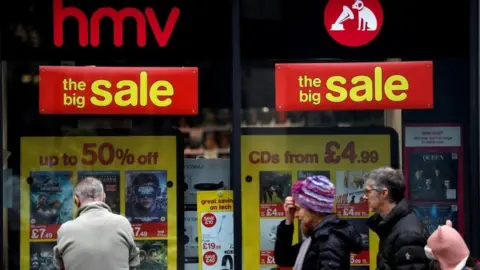HMV: Did streaming cause retailer to fail?
 Reuters
ReutersWas your first reaction to this morning's news about HMV: "I thought they went bust years ago."
Well, in a way you were right. In 2013, with sales plunging more than 10%, the firm called in the administrators.
Back then the retail analyst Mark Saunders told the Guardian: "In the digital era where 73.4% of music and film are downloaded or bought online, HMV's business model has simply become increasingly irrelevant and unsustainable."
But restructuring company Hilco saw value in a business selling music and video on the high street, buying it out of administration and keeping around half the stores open.
It seemed to go quite well for a while, with the flagship store on Oxford Street re-opened and HMV overtaking Amazon in 2015 as the biggest seller of physical music in the UK.
Early this year, Hilco was boasting that it had won the Turnaround of the Decade award for its achievements with the entertainment retailer.
But another wave of the digital revolution appears to have halted the turnaround in its tracks.
Back in 2013, it was downloads that were blamed for HMV's troubles. But they have gone into decline and streaming of both music and video is the new normal.
In millions of households, watching a movie now means turning to Netflix rather than selecting a DVD, and listening to music means streaming it from Spotify instead of heading up to the attic to hunt through old CDs.
"It is disappointing to see the market, particularly for DVD, deteriorate so rapidly in the last 12 months as consumers switch at an ever increasing pace to digital services," said Hilco Capital's executive chairman Paul McGowan in a statement.
"During the key Christmas trading period the market for DVD fell by over 30% compared to the previous year and, whilst HMV performed considerably better than that, such a deterioration in a key sector of the market is unsustainable."
With video and music still its main sources of revenue, HMV was always likely to be one of the retailers struggling to make it through the Christmas holidays.
But this is about more than a struggle to adapt to changing consumer habits.
HMV faced the same pressures of low consumer confidence, high rents and a lacklustre Christmas that have put other high street names in danger.
And don't be surprised if this is not the end of the story.
The Entertainment Retailers Association points out that when you tot up music, video and games there is still a market of nearly £2bn worth of physical products.
Big releases such as The Greatest Showman, Ed Sheeran and Adele have still attracted millions who want to own a physical copy.
So maybe there is another turnaround specialist out there to keep the HMV name alive into its second century.
